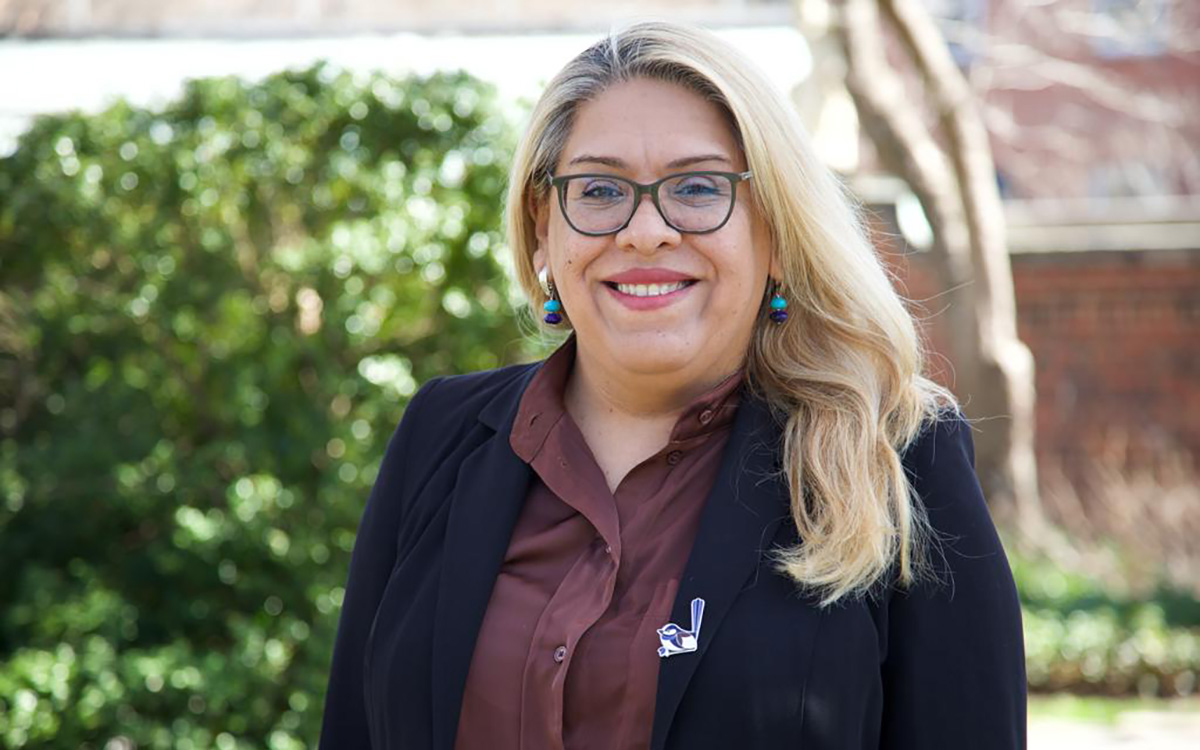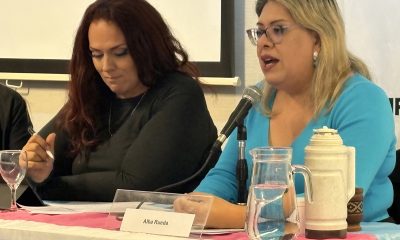South America
Argentina’s former special envoy for LGBTQ rights criticizes new government
Alba Rueda resigned before President Javier Milei took office

Argentina’s former Special Representative on Sexual Orientation and Gender Identity during an exclusive interview with the Washington Blade discussed recent setbacks in LGBTQ rights in the country.
Alba Rueda, a transgender woman who held the position in former President Alberto Fernández’s administration, revealed the challenges and risks faced by the queer community in the South American country in which 57.4 percent of the population lives in poverty, which is the highest rate in 20 years. The Catholic University of Argentina’s Observatory of Social Debt also notes Argentina began 2024 with a 20.6 percent inflation rate; this figure is 254.2 percent from year-to-year.
President Javier Milei took office in December.
“We received a request from our president at the time, Alberto Fernández, that we submit our resignation as part of the team that integrates the presidency,” Rueda told the Washington Blade.
Rueda explained she “resigned on Nov. 28, a few days before, to make it effective on Dec. 10 with the new government and since then, since Milei, the presidency and the chancellor, Daniela Elena Mondino, took office, (her post) was eliminated. It was already foreseeable according to Milei’s statements about closing the offices on gender perspective.”
“Our special representation was closed. My colleagues were redirected to other areas,” Rueda explained. “The person who accompanied me in political terms resigned with me, so the two of us left on Dec. 10, and the rest of the technical staff was relocated within the Foreign Ministry.”
The former ambassador described how the closure of her position and the elimination of the Women, Gender and Diversity Ministry represent a significant setback in the protection of LGBTQ rights in Argentina. She stressed that while the country was a pioneer in passing progressive laws for the LGBTQ community, the lack of effective implementation and declining government commitment are jeopardizing these advances.
“We argued that it had been a long time since very significant laws were passed in our country and that they had to be translated into national and local public policies,” she explained. “LGBTIQ+ people not only have to be protected formally in the law, but we have to change and modify the living conditions of our community that has experienced discrimination, violence and persecution for many years.”
She added “to change that culture, there needs to be not only a formal framework, but functioning democratic institutions”
“This elimination has a direct affectation to the rights of LGBTIQ+ people,” said Rueda.
The interview revealed how Milei’s government has dismantled institutions and policies designed to protect queer people.
“We created, for example, a program that was the first program at the national level that was an assistance program for trans people,” Rueda said. “This program of accompaniment for the protection of their rights was in the sub-secretariat and provided economic support and was working on solving all the procedures related to access to education, health, employment, issues related to substantive issues.”
Rueda highlighted that recent political decisions are not only curtailing LGBTQ rights, but are also directly affecting the community, especially those who are economically vulnerable. The elimination of assistance programs and lack of legal protections are leaving many LGBTQ people in a vulnerable position.
“Economic rights have been affected, as is the inflationary process and the inflationary decisions of this last month are directly affecting the middle class, lower middle class and the most impoverished sectors,” said Rueda. “It directly affects not only economic rights of the LGBTIQ+ population that belongs to these classes, but also affects rights that are not being worked within the framework or promoted within public policies.”
Rueda also raised concerns about a possible increase in violence towards LGBTQ people in Argentina, comparable to what has been observed in other countries under hostile political leadership. Rueda stated incidents of violence have already been recorded and that the current political climate is fueling discrimination and hatred towards the LGBTQ community.
“It started during the campaign, and I think that during the whole last year we saw how effectively, punctually in social networks and in the public space there was a whole attack on LGBTQ+ people,” she said. “Let’s not forget during the campaign that the main candidates who are the president, the vice president and the chancellor expressed themselves in the wrong way, generating with their ignorance a completely wrong message in the media, amplifying these messages that directly affect the rights of LGBTQ+ people.”
Rueda recalled the vice president “expressed in her campaign that for her it was not necessary to call marriage a union of people of the same sex … that was the civil union and saying that marriage was a figure associated with religious aspects.”
While Milei “in an interview also during the presidential campaign, said that he did not care if people want to have sex with other people of the same sex or with animals, such as elephants, equating and putting on the same level the consensual relations of people of the same sex over 18 as zoophilia.”
The situation has reached the point that different WhatsApp groups created to seek help during the COVID-19 pandemic became active again because of the interruption of the National Social Protection Plan and changes to an employment program that made vulnerable trans people in Argentina more at-risk.
“We are in a bad moment for the rights and quality of life of LGBTQ+ people,” Rueda said.
Chile
Transgender woman sues Chilean national police
Isabella Panes alleges she suffered harassment, exclusion after becoming ‘carabinera’

Isabella Panes in 2022 was celebrated as a symbol of inclusion.
Wearing an olive green uniform and a shy smile, she appeared in the media and on social media as Chile’s first trans female “carabinera” or national police officer. The Carabineros promoted Panes as a sign of openness, but that story has become a dramatic case of institutional discrimination.
Panes today faces the Carabineros in court.
She has denounced a series of systematic acts of exclusion, harassment at work, and violation of fundamental rights that she and her defense team maintains pushed her into a mental health crisis that almost cost her her life.
“My hope is that tomorrow we will be able to live in a world of equality for all. Just that we understand that we are human beings and we have to make life a lot easier for each other,” Panes told the Washington Blade during an exclusive interview.
Panes, 29, grew up in Laja in the Biobío region.
She dreamed of becoming a “carabinera” since she was a child, despite the fact that she faced discrimination because of her gender identity. After years of effort, surgeries and a difficult transition, Panes enrolled in the Carabineros Academy in 2021.
Panes faced the challenge of making her medical processes compatible with the physical demands of training. Even so, she graduated with good marks, and was recognized as part of the new institutional image the Carabineros wanted to project after the 2021 social unrest tarnished their image.
This institutional support disappeared after the media campaign.
Panes alleges she was marginalized from operational duties and relegated to administrative tasks, despite her interest in and training to patrol the streets like any other officers.
“I joined the Carabineros to serve, not to be a marketing decoration,” she said. “I was offered to be part of the change, but only if I kept quiet and accepted the mistreatment.”
The accusations against the Carabineros are serious: Constant mockery by colleagues, dissemination of private information about her personal life, invasive questions about her body and sexual orientation. Panes’s legal representatives said this abuse took place within a context where the institution did not take effective measures to protect their client.
The Carabineros Social Security Administration, known by the Spanish acronym Dipreca, also refused to cover her transition-related medical procedures, arguing they were “aesthetic,” despite medical reports that indicated their importance for Panes’s mental health and well-being.
Panes in January attempted to kill herself by suicide. She managed to survive after calling Chile’s 4141 mental health care number for help.
“They were killing me slowly, from the inside,” said Panes.
Panes has brought her case to the Supreme Court after a lower court ruled in favor of Dipreca’s decision to not cover her medical treatments.
Her legal team in a lawsuit has also accused the Carabineros of employment and systematic discrimination. Panes is seeking damages and institutional reforms.
“The Carabineros used Isabella to clean up its public image, but when it came to guaranteeing real rights, they abandoned her,” said Javiera Zúñiga, spokesperson for the Movement for Homosexual Integration and Liberation, a Chilean advocacy group.
“It is not enough to show up at the Pride march,” she added. “True inclusion is demonstrated in deeds, in daily dealings, in respect for the dignity of all people.”
Panes’s case starkly exposes the limits of diversity policies when there is no deep institutional commitment to implement them.
“I am no longer afraid,” said Panes, ”What happened to me cannot happen again. Not for me, but for all those who come after me.”
Brazil
US lists transgender Brazilian congresswoman’s gender as ‘male’ on visa
Erika Hilton has represented São Paulo since 2022

A transgender Brazilian congresswoman says the U.S. issued her a visa that listed her gender as “male.”
Erika Hilton on Wednesday wrote on her Instagram page that she requested a visa that would have allowed her to travel to the U.S. in order to participate in the Brazil Conference at Harvard University and the Massachusetts Institute of Technology.
The conference took place earlier this month.
“I was classified as ‘male’ by the U.S. government when I went to get my visa,” wrote Hilton, who added a visa she received from the U.S. in 2023 listed her gender as “female.”
Hilton is a Black travesti and former sex worker from São Paulo who won a seat in the Brazilian Congress in 2022. The Washington Blade spoke with Hilton shortly after her election.
“It is a big responsibility … but I feel very honored,” said Hilton. “I very much like to be able to be a representative for my people, and the more than 250,000 people who voted for me have confidence in me,” she said after she spoke at a rally in support of now Brazilian President Luiz Inácio Lula da Silva in a São Paulo square. “This demonstrates that our work has the potential to have a gigantic reach; where we can advance efforts to end death, poverty, misery, genocide that we have.”
President Donald Trump in his inaugural speech announced the federal government’s “official policy” is “there are only two genders, male and female.” The Trump-Vance administration has also banned the State Department from issuing passports with “X” gender markers.
Germany and Denmark are among the countries that have issued travel advisories for trans and nonbinary people who plan to visit the U.S. These warnings come ahead of WorldPride, which is scheduled to take place in D.C. from May 17-June 8.
Hilton said she is “not surprised” the U.S. issued her a visa with a male gender marker.
“I’m also not surprised by the level of hatred and fixation these people have with trans people,” she said. “After all, the documents I presented are rectified, and I’m registered as a woman, even on my birth certificate.”
Hilton further accused the U.S. of “ignoring official documents from other sovereign nations, even from a diplomatic representative.”
“At the end of the day, I’m a Brazilian citizen, and my rights are guaranteed and my existence is respected by our own constitution, legislation, and jurisprudence,” she said.
Editor’s note: Duda Salabert, another transgender Brazilian congresswoman, also said the U.S. listed her gender as “male” on her American visa.
Argentina
Gay, nonbinary parent fights for family in Argentina’s courts
Leonardo Hatanaka alleges they were fired after requesting paternity leave

An unprecedented case could set an important legal precedent for the rights of labor rights for LGBTQ families in Latin America.
Leonardo Hatanaka, a Brazilian pharmaceutical professional, expects an imminent ruling from the Superior Court of Justice in the Autonomous City of Buenos Aires in a case that alleges discriminatory dismissal based on sexual orientation, gender identity, and xenophobia after their son Matteo’s birth in Argentina via “solidarity gestation.” Human rights organizations and international agencies have followed the case closely.
Genzyme de Argentina S.A. and Sanofi in 2023 fired Hatanaka weeks after they notified them of their son’s paternity and requested 180-day parental leave.
“Matteo’s birth was the realization of a dream and the right to form a family with love, dignity and equality, even if that means having to fight every day for our family to be recognized as such,” Hatanaka told the Washington Blade in an exclusive interview.
The National Institute Against Discrimination, Xenophobia and Racism, a government agency known by the acronym INADI that President Javier Milei’s administration has shut down, in November 2023 said Hatanka’s termination was motivated by discrimination based on sexual orientation and gender identity.
(Milei took office in December 2023.)
The General Directorate of Coexistence in Diversity in Buenos Aires’s government in 2024 said institutional xenophobia motivated the firing.
“I am a gay man, foreign, nonbinary, and I had requested to exercise my right to parental leave,” Hatanaka explained. “The company denied access to a basic right to care, which it does provide in other countries, and did not provide any medical coverage for our son, despite his legal registration with both parents’ names.”
Sanofi did not acknowledge responsibility, offer apologies or any kind of reparations, despite the two rulings.
“It was devastating. I was caring for a newborn, at a moment of enormous vulnerability, and the company chose just that moment to abandon us,” said Hatanaka.
The National Labor Court overturned an initial injunction that ordered Hatanaka’s reinstatement. Hatanaka appealed the decision to the Superior Court of Justice in the Autonomous City of Buenos Aires.
“I hope for justice; that the discrimination suffered is recognized, and that this ruling serves as a precedent for all diverse families and LGBTQ+ people who are seeing their rights violated,” said Hatanaka.
The Argentine LGBT Federation, SOS Homophobie in France, and Mothers of Resistance in Brazil are among the organizations that have expressed their support. The latest U.N. report on anti-LGBTQ discrimination also notes the case.
“Companies must go beyond marketing,” Hatanaka emphasized. “Real inclusion requires concrete actions, consistency, and respect for their own policies.”
Hatanaka stressed that “there are instruments such as the UN Guiding Principles on Business and Human Rights. It is time for them to comply with them.” The lawsuit has also become a symbol of the struggle for equality and protection of families with parents who are the same sex.
“I feel I represent many LGBTQ+ families who live in fear of losing everything by exercising their rights,” said Hatanaka. “LGBTQ+ parenting is legitimate, real and deserves protection. No family should be punished for existing.”
-

 District of Columbia5 days ago
District of Columbia5 days agoFinal push to raise funds, fill D.C. hotels as WorldPride nears
-

 El Salvador3 days ago
El Salvador3 days agoGay Venezuelan makeup artist remains in El Salvador mega prison
-

 District of Columbia4 days ago
District of Columbia4 days agoReenactment of 1965 gay rights protest at White House set for April 17
-

 Maryland5 days ago
Maryland5 days agoFreeState Justice: Transgender activist ‘hijacked’ Moore’s Transgender Day of Visibility event












